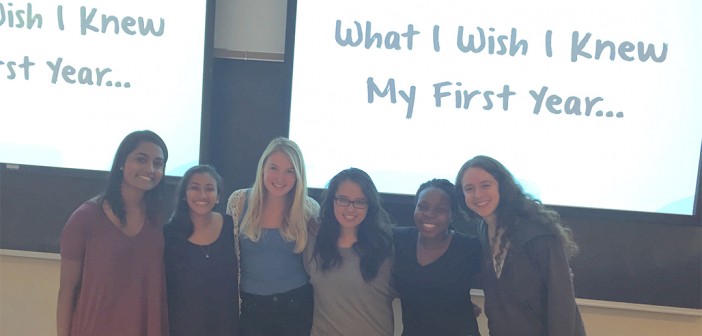Trishna Dave, ’16, wishes she could have talked to an adviser in her same field of study, understood the differences between a PIN and an alternate PIN and knew to have a back-up schedule when registering for classes as a first-year student at Lehigh.
While Dave’s friends had peer-mentor advising programs in the College of Engineering and College of Business. She said the College of Arts and Sciences recently established its own program, the Schaufeld Scholars Program, to help guide students in the college and teach them these skills.
Dave is now a mentor in the Schaufeld Scholars program, which is sponsored by Karen Schaufeld, who is a member of the Dean’s Advisory Council.
Susan Ellis, the director of the academic advising center for the College of Arts and Sciences, and Jennifer Swann, the director of Student Success, started the initiative in August 2015.
“The main goal of the scholar’s program is to increase student retention because if a student feels that they have support and help during their first year, they are more likely to remain at Lehigh,” Ellis said. “The peer interaction is a key part in making students feel like they have a mentorship and have student in a similar discipline to ask questions regarding academics.”
Dave worked with Swann to create an application and brainstorm ideas to effectively initiate the program. About 10 applications were received, and six students are active participants in the program.
Cameron B. Wesson, the associate dean of undergraduate programs for the College of Arts and Sciences, wrote in an email the program highlights veteran students sharing their experiences with first-year students.
“We recognize that students share insights about course offerings and career paths all the time, but the Schaufeld Scholars receive specific training that allows them to advise other students with a more comprehensive understanding of the college and its various academic programs,” Wesson wrote.
This past fall semester, the Schaufeld Scholars helped to plan programs such as 5×10 sessions for first-year students. The scholars led a 5×10, What I Wish I Knew My First Year, and gave advice about surviving their first year at Lehigh. These programs reached about 200 students and covered topics such as how to register and how to form relationships with professors.
“The 5×10 could have been presented by Dr. Swann and I, but it’s more meaningful to hear the same information from students who underwent a similar experience,” Ellis said.
Looking to the future, the program’s goal is to expand to 20 student scholars for the Fall 2016 semester.
Emily Shreve, a graduate assistant in the Office of the First-Year Experience, wrote in an email that she sees the impact student mentoring has on first-year students.
“It is hard to underestimate how powerful it can be to have a conversation with someone who has just been through what you are working through,” Shreve said. “The type of advice and insight offered by a peer differs from the type of advice I can offer. It seems ideal to have a combo of perspectives, from those who are still somewhat in the thick of things to those who can look at the situation with more distance. Most important than any specific knowledge or advice, however, is the feeling of being part of a community of support.”
Wesson said the only drawback with the program is that students who are selected as Schaufled Scholars need to take the program seriously because the scholars will be working with students of wide range of majors.
He also said students value the opinions of peers in a different way than they do faculty members.
“We don’t see this as a replacement for faculty mentoring and advising, but as a supplement that can reinforce many of the strategies for success at Lehigh and beyond,” Wesson said.
Dave said she believes the Schaufled Scholars program is beneficial to students in College of Arts and Sciences because so many students are undecided and have the scholars as a resource to seek advice.
“It is really important to have peer mentors because you can learn so much from people who are older than you,” Dave said. “It is a good way to make connections professionally, but also personally.
“As the program develops and a mentor is meeting with the mentee and the mentor is chatting about a club and then the mentee becomes interested in that club, it proves how peer mentoring shows what else Lehigh offers beyond academics.”






Comment policy
Comments posted to The Brown and White website are reviewed by a moderator before being approved. Incendiary speech or harassing language, including comments targeted at individuals, may be deemed unacceptable and not published. Spam and other soliciting will also be declined.
The Brown and White also reserves the right to not publish entirely anonymous comments.